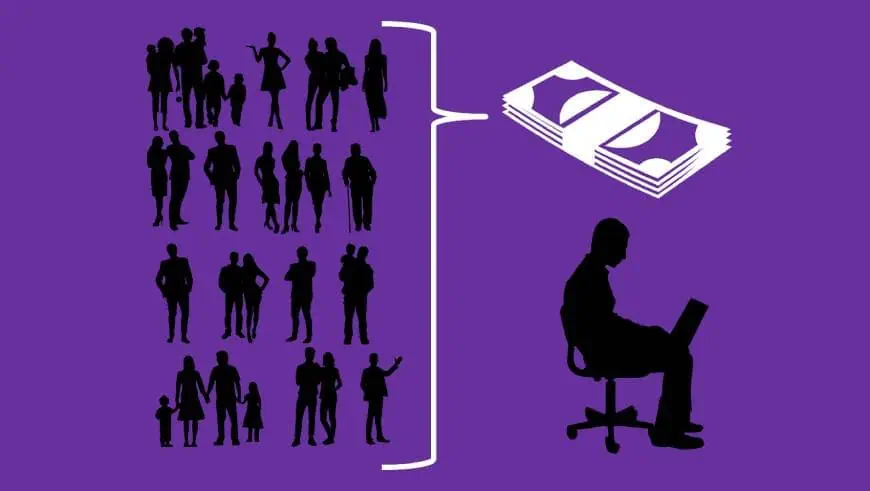It can be difficult to bring your idea to fruition without sufficient funding. But don’t worry; there’s a solution: crowdfunding. Crowdfunding enables prospective company entrepreneurs to make their ambitions come true.
Thinking about launching a tech product, making a film, or starting a non-profit? Crowdfunding could be the key to your success. Let’s dive into how crowdsourcing operates and how it could assist you in achieving your objective.

What is Crowdfunding?
Crowdfunding allows individuals or corporations to raise funds for their projects or operations by enlisting the aid of a large number of people all around the world. Using social media and numerous crowdfunding websites, each fan donates a small amount, as low as $10, to help bring your concept to life.
Instead of relying on a small group of investors or corporations, crowdfunding is obtaining financial assistance from a large number of people who are interested in supporting your project.
Crowdfunding platforms
Crowdfunding sites/ platforms usually attract individuals looking to fund a project. These platforms have restrictions on who can set up a fund and platform. They also charge fees ranging between 5% to 12%, as this is the main way they fund businesses.
Below are the most popular crowdfunding platforms:
GoFundMe
GoFundMe, created in 2010, is one of the largest crowdsourcing services. More than 150 million people and businesses have profited from the platform. Since 2010, platform-based crowdfunding campaigns have produced $30 billion.
GoFundMe is popular with individuals seeking personal financial help for medical expenses or disasters rather than starting a business.
Indiegogo
Indiegogo started crowdfunding in 2008 mainly for independent films. Over the years, it has evolved to include other types of projects. The platform allows projects and businesses to decide if the funding is flexible or fixed, and whether they can wait till the target is reached or withdraw the funds as they come.
Kickstarter
Founded in 2009, Kickstarter is a popular funding platform for creative and tech projects. According to Statista, Kickstarter has launched over 616,000 projects and received over $7.78 billion in pledges.
Another way Kickstarter sets itself apart is by imposing a time limit for every campaign and returning funds to backers should the project fail. The platform also prohibits political fundraising, medical projects, and gambling.
Benefits of crowdfunding
Social media has made it easier for crowdfunding projects to spread and receive funding, reaching a larger audience of investors or funders. Other key benefits of this funding method include:
- Access to funds: Crowdfunding provides different projects/businesses with access to capital they wouldn’t have ever had, as banks and many investors are selective of who they fund.
- Access to a larger audience: A crowdfunding campaign opens you up to a larger market and helps you create awareness of your project above getting funds. It also offers you opportunities to network with potential partners and industry leaders who can help you expand your product scope.
- Free advertising and marketing: If you are crowdfunding for a business, your funders will most likely become your biggest customers, particularly if you market your product well.
- Gaining insights on your product: Crowdfunding enables you to know if your product actually has a market and if any improvements can be made.
- Less risk: Crowdfunding is less risky as there is no debt to pay, especially if the business or project fails.
Disadvantages of crowdfunding
- Time-consuming: For you to reach your funding goal, you will need to spend time campaigning for your project online.
- Can be costly: Some people hire social media managers to market their project. You may also need to offer rewards to incentivize people to give towards your project.
- There is no guarantee: There is no guarantee you will be able to reach your funding goal, which can be disappointing if you spend a lot of time and money on promoting your project.
- Loss of project control: With time, your funders may want a say in how you run your business or how you spend the money you have received.
Types of crowdfunding
Although crowdfunding is built upon using a large network of people to fund your project/business, there are different types of crowdfunding one can use.
Equity crowdfunding
Equity crowdfunding involves having investors pour money into your project in exchange for shares or a small stake in your business. Most growth-based businesses choose this type of funding.
When you choose equity-based finance, you gain access to significant resources and devoted investors. You can also benefit from the knowledge of these investors, who each bring considerable experience to the table.
On the flip side, you’ll have to relinquish a portion of your business ownership and keep up with regular reporting requirements.
Reward crowdfunding
When it comes to reward crowdfunding, backers have the opportunity to contribute to your project and get some cool non-financial rewards in exchange. The point is to ensure the reward doesn’t cost much.
With reward-based crowdfunding, you retain all ownership of your project. It also enables you to create a community of supporters. All promised rewards must be delivered which can be quite costly.
Debt crowdfunding
Debt crowdfunding or peer-to-peer lending exchanges a financial stake in your business for capital. For example, you can borrow from investors at a lower interest rate than from a bank.
This method has the potential to gain more capital and support from the investors as they hope to make a return. You still get to retain full ownership of your business but will be obligated to pay back with interest even if the business doesn’t succeed.
Donation crowdfunding
This type of crowdfunding is popular among non-profits and charities, particularly smaller organizations as people donate to causes they care about. The return on investment isn’t financial but social good. Most backers who donate to such projects believe in them and do not require any repayment.
Donation crowdfunding depends on the emotional response of a donor but this appeal can be a hit or miss, meaning there’s no guarantee you’ll reach your goal. This can be detrimental in platforms that impose a refund if the target isn’t reached.
Final thoughts
Crowdfunding can help you kickstart a life-changing idea. Crowdfunding democratizes finance and gives your ideas a voice. It taps into the collective power of passionate funders who believe in your project just as much as you do and ensures your project comes to life.











